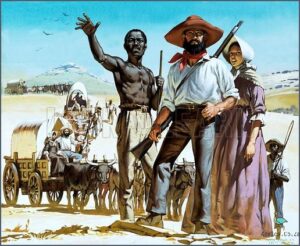
Bantu education was a system of education designed to prepare black Africans for lives as manual laborers in a white-dominated society. It was implemented in South Africa from 1948 to 1979. Bantu education was based on the belief that blacks were inferior to whites and that they needed to be educated accordingly. This meant that blacks were taught basic skills such as literacy and arithmetic, but they were not given the same opportunities to learn as whites. Bantu education was widely criticized by black Africans, who saw it as a way to keep them in their place. In 1979, the Bantu education system was abolished and replaced with a more equitable one.
Contents
When Was Bantu Education Passed
The Bantu Education Act was passed in South Africa in 1953. This Act was part of the apartheid system and replaced the existing law, which had allowed for some form of integrated education. The Bantu Education Act sought to create a separate educational system for black South Africans, providing them with an inferior education by design. This act led to the creation of Bantu schools, which were poorly funded and had a limited curriculum. These schools were frequently overcrowded and lacked necessary resources, including textbooks and adequate teaching materials. The Bantu Education Act was abolished in 1979, but its legacy of educational disparity lives on in South Africa today.
Overview of the Apartheid System
The Bantu Education Act of 1953 was a major turning point in South African history and the Apartheid system. It was the first major step in the institutionalization of racial segregation and inequality in the country. This Act, which was passed by the National Party government, was a major part of their vision for creating a “separate but equal” society for all South Africans, regardless of their race.
The Bantu Education Act had far-reaching consequences for South African society, and it was the first major step in the implementation of the Apartheid system. The Act was designed to separate black and white South Africans in all areas of life, including education. It was also meant to create educational systems that would better prepare black South Africans for their roles in the new society.
Under the Act, all black South Africans were required to attend “Bantu schools”, which received significantly less funding than white schools. These schools were often overcrowded, understaffed, and lacked basic resources. The curriculum was also designed to make sure that black students did not receive a high-quality education and to keep them in a subordinate role in society.

The Bantu Education Act had a profound impact on South African society. It led to significant disparities in educational outcomes between white and black South Africans, and it also resulted in the creation of a two-tiered education system. This system was designed to ensure that black South Africans were not afforded the same opportunities as white South Africans.
The Bantu Education Act was one of the cornerstones of the Apartheid system, and its effects can still be felt today. It is important to understand the legacy of this Act in relation to contemporary issues such as inequality, racism, and education. The Bantu Education Act was a major step in the institutionalization of racial segregation and inequality in South Africa, and it continues to have an impact on South African society today.
Timeline of the Bantu Education Act
The Bantu Education Act of 1953 is a landmark piece of legislation that had a profound impact on South African society for decades. This law, which was enacted by the National Party, sought to separate educational facilities for blacks and whites, and was an integral part of the Apartheid system of racial segregation. The Act formally established a framework of racial segregation in South African schools and universities, and this system of separation was to remain in place until the end of Apartheid in 1994.
The Bantu Education Act was passed in 1953, and its effects were felt immediately. Under the new law, South African schools and universities were required to be racially segregated and black students were to only receive education up to the level of junior secondary school. This meant that black students would not have access to education beyond the junior level, and would not be able to attend universities. This was a major setback for black South Africans, as it limited their educational opportunities and limited their prospects for future economic advancement.
In the decades following the passage of the Bantu Education Act, the level of educational inequality between black and white South Africans grew significantly. Black students were routinely given lower quality textbooks, classrooms, and equipment than their white counterparts, and were often taught by poorly-trained teachers. This inequality was compounded by the fact that black students were also unable to access university education, as they were legally barred from attending universities until the end of Apartheid in 1994.
The effects of the Bantu Education Act were felt by generations of black South Africans, and the legacy of this law is still felt today. The Act served as a major obstacle to educational equality in South Africa, and its effects are still felt today in the form of inequality in educational attainment and economic opportunity. Although the Act was officially repealed in 1979, its effects are still felt today in the form of educational inequality between black and white South Africans.

Impact of Bantu Education on South African Society
When the South African government passed the Bantu Education Act in 1953, it had a long-lasting impact on the society and culture of the country. The act was designed to implement a system of education that was intended to separate Black South Africans from White South Africans, and to ensure that Black South Africans received a lower quality of education than their White counterparts.
The Bantu Education Act saw the development of a curriculum that was designed to “train” Black South Africans for the roles that the government had designated for them. This meant that Black students were taught subjects like industrial arts and agriculture, rather than being exposed to a more comprehensive range of subjects. This had the effect of limiting the knowledge and skills that Black South Africans could acquire, and in turn, the opportunities that they were able to pursue.
The effects of the Bantu Education Act were felt far and wide throughout South African society. Most obviously, it had a profound impact on the educational outcomes of Black South Africans. As a result of the act, Black South Africans had significantly lower levels of educational attainment than their White counterparts. This, in turn, had a knock-on effect on their overall quality of life.
The Bantu Education Act also had a major impact on the South African economy. By limiting the educational attainment of Black South Africans, it had the effect of limiting their ability to pursue higher-paying jobs and to become successful in business. This had the effect of widening the economic disparities between Black and White South Africans.
The Bantu Education Act also had a major impact on the cultural identity of Black South Africans. As part of the act, Black South Africans were taught from a curriculum that was designed to promote the idea of Black inferiority. This had the effect of reinforcing negative stereotypes about Black South Africans, and of undermining their sense of self-worth and identity.
The Bantu Education Act had a long-lasting and far-reaching effect on South African society. By limiting the educational attainment of Black South Africans, it had a major impact on their overall quality of life, and the economic and cultural disparities between Black and White South Africans were widened as a result.
Conclusion
The Bantu Education Act was passed in 1953 by the apartheid government of South Africa. The law was an attempt to control the education of black South Africans and reinforce the racial segregation of white South Africans. It resulted in the replacement of mission schools and their curriculum with a system of separate education for black South Africans and the increased use of Afrikaans as a language of instruction. The Bantu Education Act has been widely criticized for its negative impact on the education of black South Africans and is now seen as a major contributing factor in the inequality and poverty that persists in South Africa today.



